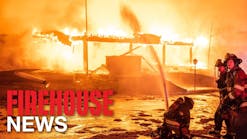Though the Juvenile Firesetter Intervention Program has existed for years through the Contra Costa Fire Protection District, officials there say parents and even local schools do not realize it exists, or find out only when it's too late.
And with the spate of fires in recent months at area schools, the fire district wants to get the word out.
"People don't realize that if they have a child who is a little too interested in fire, they can call us," said Jojy Smith, fire education coordinator with the fire district.
"You say the word, 'arson,' to young kids sometimes, and they look at you like, 'Huh?'" she said. "Often times, they don't know that setting fires is a crime. All it takes is a little education."
Smith said the program is voluntary, meaning parents can call and enroll their children free of charge. And there are no strings attached.
"We try to make it comfortable, but a lot of times parents don't call us because they think by doing that, their children will get in trouble or that we'll call the police in," Smith said. "That's not the case."
First, Smith and her staff will meet with the parents for an interview to find out about the child's history with fire. Then, there are one-on-one talks with the child.
Throughout the program's existence, participants have been children as young as 3 and 4 years old, and as old as 17. In years past, the program has helped some 200 children per year. But the numbers have been low lately, Smith said, because of dipping awareness.
Many times, children are simply curious about fire, and just watching an educational video and writing the program's required essay is enough to stop that. Other children have deeper psychological problems, where setting fires is only a symptom of a larger problem. In that case, program officials will work to make sure the child can see a psychologist.
The program also works with the Contra Costa County Sheriff's Office and local police departments once a child or teen has been arrested.
"So some kids come to our program involuntarily, but we want to make sure people know we don't just cater to those who have been caught or are in trouble," Smith said.
Generally, after interviews, the essay and educational videos, Smith's staff will check in with families a month or so later to see how things are going.
"Last year, we only had one repeat offender," Smith said. "That's pretty good."





